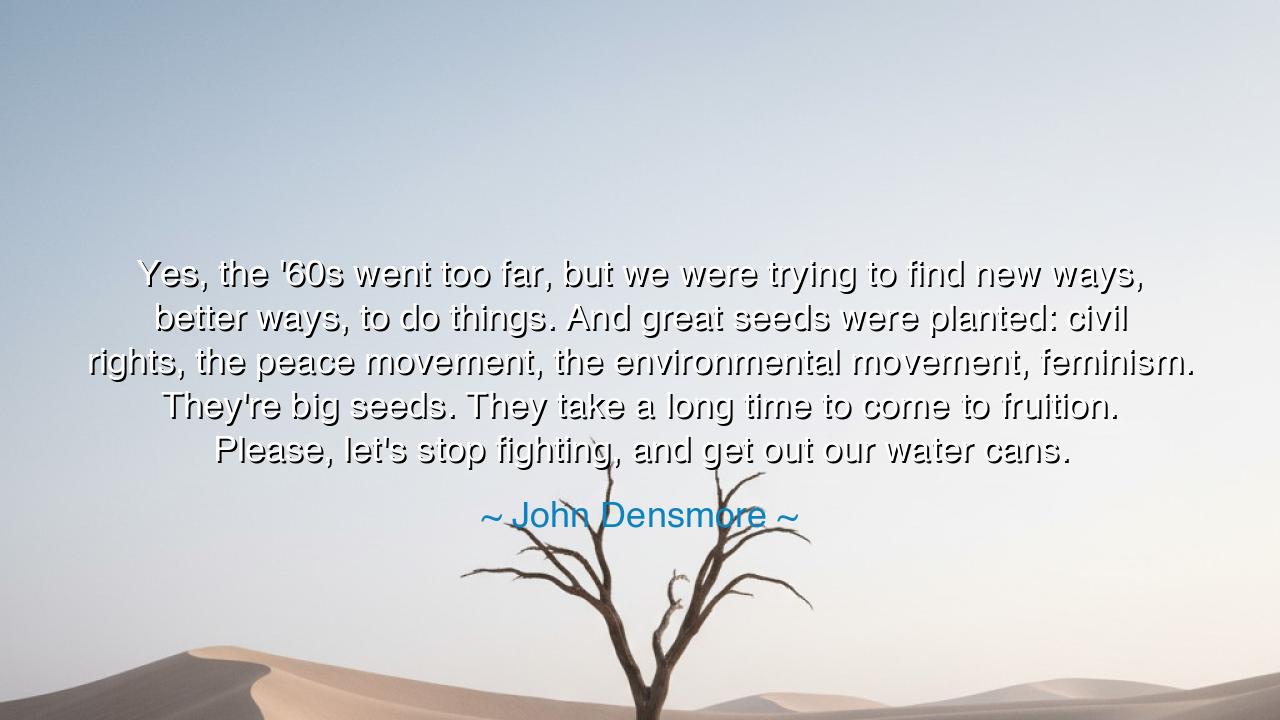
Yes, the '60s went too far, but we were trying to find new ways
Yes, the '60s went too far, but we were trying to find new ways, better ways, to do things. And great seeds were planted: civil rights, the peace movement, the environmental movement, feminism. They're big seeds. They take a long time to come to fruition. Please, let's stop fighting, and get out our water cans.






In the words of John Densmore: “Yes, the ’60s went too far, but we were trying to find new ways, better ways, to do things. And great seeds were planted: civil rights, the peace movement, the environmental movement, feminism. They're big seeds. They take a long time to come to fruition. Please, let's stop fighting, and get out our water cans.” These words are like a gentle call from the elder to the youth, reminding us that even amidst turmoil, chaos, and excess, something precious was sown—something that must not be forgotten, but patiently nurtured until its harvest comes.
The ancients often spoke of the planting of seeds as a symbol of hope. For when a farmer casts seeds into the earth, he knows he will not eat their fruit tomorrow. He must labor, wait, and trust that time, rain, and sunlight will bring the harvest. Densmore, reflecting upon the storm and brilliance of the 1960s, reminds us that though the decade may have burned with extremes—rebellion, experimentation, upheaval—it was also the time when humanity dared to dream of justice, equality, peace, and respect for the earth. These were not weeds of chaos, but seeds of change, planted deep in the soil of history.
Consider the civil rights movement, born in the face of segregation and injustice. Men and women marched, sat at counters, endured violence, and even gave their lives, believing in a day when their children would be judged not by the color of their skin but by the content of their character. Though progress came slowly, those seeds blossomed into new freedoms, laws, and opportunities, and though the work is not finished, the garden is no longer barren. The farmer who despairs because the sprout is slow to grow forgets that the oak begins as a small acorn, and takes generations to rise.
The peace movement too arose amidst the thunder of war. Young voices cried out against endless conflict in Vietnam, demanding that life be cherished over conquest. Though the war raged on, the seed of questioning authority, of demanding accountability for the cost of human lives, was planted deep. Today, whenever a nation debates the wisdom of sending its youth into battle, the roots of that seed push against the soil, reminding us of the courage of those who once cried out, “No more.”
So too the environmental movement, which began when rivers burned with pollution and skies darkened with smog. It was then that people awakened to the truth that the earth is not an endless storehouse to be plundered, but a living home to be protected. Laws were written, parks preserved, and awareness spread. Even today, as climate change casts its shadow, that seed planted decades ago continues to grow, urging us to water it with action, lest the garden of the earth wither.
And the feminist movement, which sought not domination but balance. Women lifted their voices for the right to education, to vote, to work, to lead. The seed of equality was sown, though weeds of resistance still crowd around it. Yet generation by generation, the harvest draws nearer, as daughters walk paths once closed to their mothers. Like the patient tending of vines, this struggle requires constant care, but its fruit promises freedom not only for women, but for men as well, for equality liberates all.
The meaning of Densmore’s words is thus clear: we must cease our endless quarreling and learn again the art of watering the seeds. It is not enough to shout, to fight, to rage at the fields. Seeds grow not through strife, but through care—through teaching, through dialogue, through persistence. To abandon the seeds because they are slow is to betray the labor of those who planted them. To neglect them is to condemn the future to famine. But to water them patiently is to ensure that future generations inherit a garden rich with justice, peace, and freedom.
So let this teaching endure: do not despise the imperfect beginnings of a better world. Honor the seeds planted by those before you, and tend them with diligence. Work for justice in your community, care for the earth in your daily choices, speak peace in your conflicts, and uplift equality wherever you see its absence. For each small act of care is a drop of water on the seed of hope. And remember: the harvest of great change is never reaped in one lifetime, but only through the faithful tending of many.






AAdministratorAdministrator
Welcome, honored guests. Please leave a comment, we will respond soon